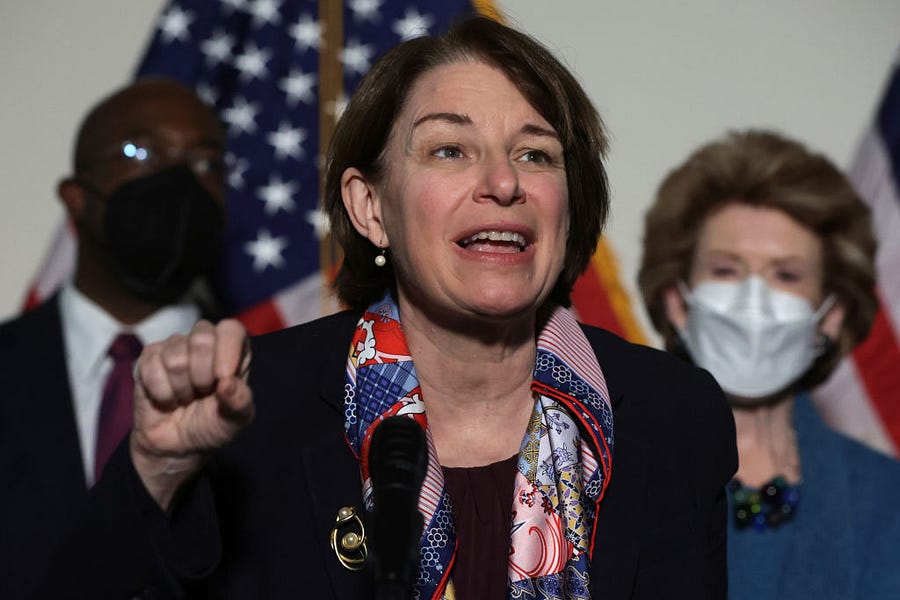It’s no secret that both sides of the political aisle—for widely different reasons—have targeted Big Tech for being too big. But in pushing to regulate a select few businesses, Congress has put forth bills that are at odds with each other. And in doing so, our lawmakers’ efforts risk making the internet a less hospitable place for user-generated content, and—by proxy—for our free expression.
In the last few months, we’ve seen both chambers of Congress push legislation designed to overhaul American competition policy and the logic-driven consumer welfare standard that has guided antitrust legislation for decades.
Last summer, the House Judiciary Committee hastily rushed a package of five bills to target only a few companies with radical antitrust reforms including: discouraging mergers and acquisitions, mandating interoperability, and banning self-preferencing. Earlier this year, Sen. Klobuchar and Sen. Grassley pushed the American Innovation and Choice Online Act, companion to the House American Choice and Innovation Online Act, that included a ban on self-preferencing and mandated nondiscrimination of goods and services on websites. From an antitrust perspective, nondiscrimination has largely focused on self-preferencing to target competitive relationships between companies online—how Amazon promotes its own brands like Happy Belly or Whole Foods 365, how a Google Search for restaurants has Google Maps functionality, or even how Amazon offers Prime Delivery.
Only weeks later, the Senate Judiciary Committee also passed antitrust reform targeting app stores—the Open App Markets Act—to mandate that Apple and Google open up their phone operating systems to third-party app stores, payment processors, and other forms of side-loading.
But in pushing to stop Big Tech from this alleged gatekeeping, Congress is forgetting free demands they’ve made of America’s tech industry regarding free speech and online safety. The aforementioned antitrust bills run counter to congressional content moderation proposals and could make it harder for websites to moderate user-created content by opening up them to litigation if these websites remove rule-breaking content by competitors. Many of the very same lawmakers pushing antitrust reform voted to pass the EARN IT Act out of committee to the Senate floor—a proposal that would increase the risk of litigation for services that host user-created content and private messaging.
Put simply, our lawmakers are fighting against themselves. They want more content moderation regulation to protect Americans from harmful speech, but no content regulation when it comes to antitrust. By sending severely mixed messages on how it wants online platforms to moderate content, Congress is setting the scene for regulations that disregard their content moderation implications to hurt both online safety and free speech.
Take Sen. Klobuchar and Sen. Grassley’s American Innovation and Choice Online Act. This bill applies a principle of nondiscrimination—where a business isn’t allowed to treat users of their services differently— to prevent large tech companies from disadvantaging their competitors on their marketplaces. But in doing so, the legislation fails to address how banning the discrimination between or curation of “similarly situated business users” would make removing harmful or rule breaking content from many users that can claim to compete with big tech services very difficult and risky.
From a content moderation standpoint, banning the discrimination between users, even “similarly situated business users,” threatens the precarious balance between online safety and free speech. By mandating nondiscrimination, the American Innovation and Choice Online Act capitalizes on the threat of antitrust enforcement in a way that makes it harder for websites to take down many posts that violate a website’s community standards and would effectively tie the hands of businesses trying to responsibly remove harmful or rule-breaking posts.
Take, for example, actors like Alex Jones, Neo-Nazi leaders, and Russian disinformation actors. Alt-right businesses like Infowars, and even foreign propaganda outlets like RT, would be able to sue websites for taking down their harmful content under the guise of “nondiscrimination.” So under Sen. Klobuchar’s American Innovation and Choice Online Act, RT would have to be treated the same as a typical business or the website could be breaking competition law.
That’s why a nondiscrimination proposal that balances antitrust and content moderation is an unlikely solution. Government-mandated nondiscrimination will inevitably open up websites to an overwhelming threat of litigation. And the end-result is simple: carry all “similarly situated business users” and all their content, even if it violates community guidelines; pivot services such that influencers, businesses, and organizations can’t take advantage of the thriving world of user-generated content online; or let websites eliminate user-generated content entirely in favor of a corporate sponsored, pre-vetted factory of online content.
When hate, disinformation, and political warfare are already commonplace in today’s zeitgeist, bills like the American Innovation and Choice Online Act will make the problem worse, not better. While that isn’t the intended goal, muddling antitrust with content moderation leads to a solution no website, internet user, or lawmaker wants—an internet that could easily become overrun with disinformation and weaponized thought.
Kir Nuthi is an associate contributor at Young Voices who focuses on emerging technology issues related to digital free speech and free enterprise and a public affairs manager at NetChoice.






Please note that we at The Dispatch hold ourselves, our work, and our commenters to a higher standard than other places on the internet. We welcome comments that foster genuine debate or discussion—including comments critical of us or our work—but responses that include ad hominem attacks on fellow Dispatch members or are intended to stoke fear and anger may be moderated.
With your membership, you only have the ability to comment on The Morning Dispatch articles. Consider upgrading to join the conversation everywhere.